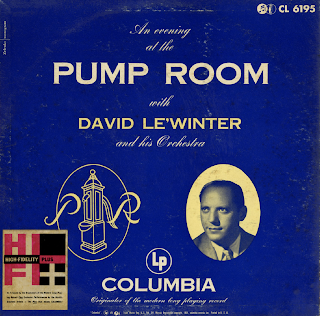Love Is Just Around The Corner
Billy Eckstine's
Imagination
EmArcy Mercury Records MG 36129
1958
From the back cover: Before the world of popular music became so infatuated with the vocal that an instrumental was a rare avis, there had already been a long tradition of ballad singers in jazz.
Does this surprise you? It shouldn't. The tough, hard-swinging jazzman has his sentimental side, and during the '30s and the '40s there were some beautiful, if saccharine, ballads sung by members of some of the greatest jazz bands ever assembled.
I'm not, of course, referring to Eddie Candon's classic I'm Sorry I Made You Cry (his only known ballad vocal, an effort whose rarity is rivaled only by that of his guitar solos). But I am referring to the singing of that great school of balladeers of whom Pha Terrell was the first prominent example and Billy Eckstine the first to break out into the broad popular music field. And the congeners have included two from the Lunceford band – trombonist Henry Wells (Remember When) and saxophonist Dan Grisson (Charmaine); one from Basie, saxophonist Earl Warren (Let Me Dream), and of course others, such as Lee Richardson and Al Hibber, who were purely vocalists. Then there are Cab Calloway and Slim Gailard, oddly enough, who are capable of singing lush ballads with the best.
Actually, despite the success of Grissom, Wells, and others, Terrell and Eckstine were the two great ballads singers from the '30s and '40s. No one who ever saw Pha Terrell standing on the stage at, say, the 125th St. Apollo backed by the Andy Kirk band and holding his hands, rather like Billy Eckstine, to sing Breeze That Blew My Gal Away is ever likely to forget it.
Eckstine, whose first major success was singing Skylark with Earl Hines' big band (his later discs of Stormy Monday and Jelly, Jelly were the blues hits of the decade) by the end of the '40s and the beginning of the '50s had developed (along with Sinatra) into the leading modern ballad stylist, the first to capture the public fancy while still retaining the full respect and affection of the modern jazz musicians.
Eckstine not only had lead a remarkable big band (wellspring for much talent of later years) but had actually pioneered in the modern jazz conception of singing (as had Sarah Vaughan with whom he is inexorably linked as a singer and was an influence). "I always liked to sing things around a chord. Horns improvise and play their own feelings, so why shouldn't singers?" Billy told me once.
And with this approach – digging out the chords, the scope of the tune, listening for the passing changes to give it color and style – Eckstine set a lasting pattern for singers. If sometimes in recent years he has seemed to stray from it, it was always with the knowledge that he could come back.
And come back he has. This album sounds like a labor of love and as such carries an authority and sincerity that should answer the critics who have been putting Eckstine down. (In re critical judgments, Billy once told me "I never knew I had a vibrato until the critics started writing about it".) There are no blues here in the real sense ("I never did like to sing blues") but there are ballads of the sort that firmly establish Billy Eckstine as one of the great romantic singers of our time.
Aside from drawing attention to the typical Eckstine ending on Ghost Of A Chance, the unidentified and mysterious feminine voice on Love Is Just Around The Corner, the deft use of a subdued version of The Champ motif in Lullaby Of The Leaves, and the small group rhythmic accompaniment on Love Is Just Around The Corner, I want to make one big point about one of the tracks on this record. What A Little Moonlight Can Do is not only one of the best Billy Eckstine vocals I have ever heard, but one of the best vocals! This is only one man's opinion, but I will be astonished and sorry (for them) if it doesn't turn out to be shared by a majority of listeners.
To Pete Rugolo must go the credit for the sympathetic accompaniment Billy receives from the orchestra. Rugolo chose his musicians well, designed his background astutely, and has produced a better showcase for the Eckstine talents than Billy has had in some time. It took imagination to do this – no wonder it is the title of the album.
Not particularly the Gerald Wiggins piano on I've Got A Right To Sing The Blues; Red Callender on Love Is Just Around The Corner; Pete (that's right, Pete, not Conte) Candoli on Love Is Just Around The Corner; Bud Shank and Don Fagerquist on What A Little Moonlight Can Do, and Larry Bunker on vibes on I Cover The Waterfront. – Ralph J. Gleason, Editor: Jam Session (G. P. Putnam's) The Rhythm Section, San Francisco Chronicle
From Billboard - June 23, 1958: Mr. "B." is in wonderful and relaxed form on this new grouping of lightly jumping standards, many of which would be classified as torch songs. Pete Rugolo's tasty, jazz-oriented backings are just right as they complement Eckstine's vocals but never get in his way. Fans will like this new set.
It Was So Beautiful
I Gotta Right To Sing The Blues
Love Is Just Around The Corner
I Don't Stand A Ghost Of A Chance With You
A Faded Summer Love
What A Little Moonlight Can Do
Imagination
Lullaby Of The Leaves
I Cover The Waterfront
I Wished On The Moon
That's All


















